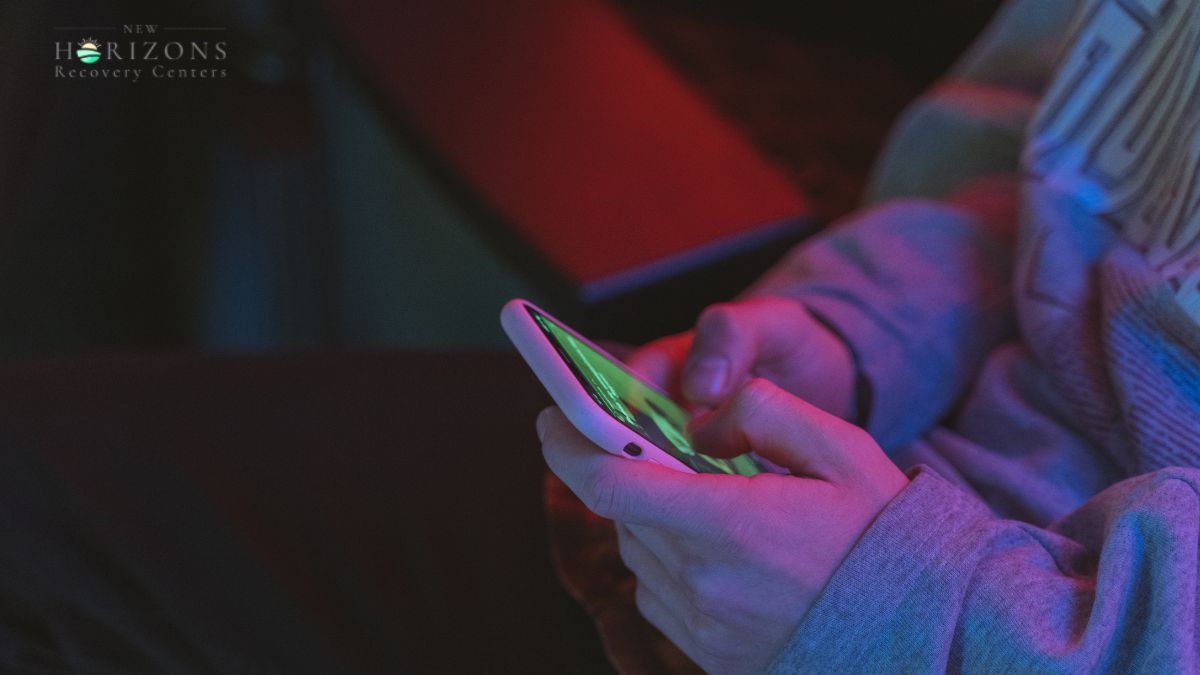
Understanding Social Media Addiction
In the realm of social media addiction treatment program, grasping the impact of social media usage and recognizing the prevalence and effects is essential for intervention and recovery.
Impact of Social Media Usage
Social media platforms are designed to be addictive, strategically crafted to engage users and keep them hooked by showcasing tailored content that aligns with their interests. This personalized approach plays into the reward system, driving prolonged engagement. The compulsive use of social media can impact various aspects of an individual's life, from disrupted sleep patterns to decreased productivity and decreased real-life social interactions.
Prevalence and Effects
Social media addiction is a prevalent issue that can manifest in withdrawal symptoms when attempting to limit or cease social media use. This addiction not only affects adults but also significantly impacts teenagers, hindering their ability to derive pleasure from activities they once enjoyed. Depression, a common mental health concern associated with excessive social media use, has shown improvement in 70% of cases after intervention, indicating the profound impact that treatment can have.
To effectively address the growing challenge of social media addiction, therapies like cognitive behavioral therapy (CBT) are often recommended. CBT assists individuals in understanding the relationship between their thoughts, emotions, and behaviors, empowering them to modify negative patterns and develop coping mechanisms to manage their social media consumption. By shedding light on the prevalence and consequences of social media addiction, awareness can be raised, and individuals can be guided towards healthier social media habits.

Treatment Options for Social Media Addiction
Addressing social media addiction requires comprehensive treatment options that cater to the individual's needs. Therapy-based approaches, motivational interviewing, and social media-blocking apps are among the effective strategies employed in combating this modern-day challenge.
Therapy Approaches
Various therapy options play a crucial role in the treatment of social media addiction. Therapies such as cognitive behavioral therapy (CBT), dialectical behavior therapy (DBT), group counseling sessions, and holistic approaches have shown promise in aiding individuals struggling with social media overuse. These therapies can be conducted in outpatient or inpatient settings, and even online platforms, providing flexibility in treatment delivery.
Therapy sessions allow individuals to delve into the underlying causes of their addiction, develop coping strategies, and learn healthier ways to manage their relationship with social media. By addressing the root of the issue and fostering behavioral changes, therapy offers a sustainable path towards recovery.
Motivational Interviewing
Motivational Interviewing (MI) is a valuable approach for individuals grappling with social media addiction. This evidence-based technique focuses on resolving ambivalence and insecurities, helping individuals find internal motivation to embrace change. By fostering a non-confrontational and empathetic environment, MI empowers individuals to explore their motivations for change and build the confidence needed to steer away from excessive social media use.
Through motivational interviewing, individuals can explore their values, aspirations, and concerns regarding social media consumption, paving the way for meaningful behavioral shifts and long-term recovery.
Social Media-Blocking Apps
In the digital age, social media-blocking apps have emerged as practical tools to aid in managing social media usage and preventing addiction. Apps like AppBlock, Flipd, Freedom, and others offer functionalities that limit or block access to social media platforms, helping individuals control their screen time and reduce the urge to endlessly scroll [4].
These apps provide customizable features that allow users to set usage limits, schedule social media breaks, and restrict access during specific periods. By incorporating social media-blocking apps into their daily routine, individuals can create boundaries and promote healthier digital habits.
Combining therapy approaches, motivational interviewing, and the integration of social media-blocking apps forms a comprehensive treatment strategy for individuals seeking to break free from social media addiction. Each of these interventions plays a vital role in addressing the behavioral, psychological, and emotional aspects of addiction, empowering individuals to regain control over their digital consumption habits and prioritize their well-being.

Social Media Addiction in Teens
When it comes to teenagers, social media addiction can have profound effects on their mental and emotional well-being. The constant connectivity and validation-seeking behavior associated with social media can lead to various challenges for this age group.
Effects on Teenagers
Teens addicted to social media often reach a point where their participation is no longer driven by pleasure but by a rewired brain that deems social media use as necessary for survival. This dependency on social media can lead to withdrawal symptoms when attempting to reduce usage and can deter teens from finding enjoyment in activities they once found pleasurable [1].
Moreover, younger generations, such as Millennials and Generation Z, are particularly susceptible to social media addiction due to their immersion in the digital age. Factors like comfort with technology, the allure of social validation, and the appeal of content creation platforms like Instagram and TikTok contribute to this vulnerability. The constant stream of content and engagement on social media platforms can hijack the brain's reward system, making it challenging for teens to detach and engage in offline activities.
Group Therapy Effectiveness
Group therapy, led by psychologists and involving teens facing similar challenges with social media addiction, has proven to be effective in alleviating symptoms of internet addiction. By providing a supportive environment where teens can share their struggles, experiences, and coping mechanisms, group therapy helps individuals feel understood and less isolated in their battle against social media addiction.
In a group therapy setting, teens learn from each other's experiences and develop healthy strategies to manage their social media usage. The camaraderie and shared journey toward recovery can boost motivation and accountability among participants. Additionally, group therapy offers a platform for teens to build social skills, enhance self-awareness, and establish healthy boundaries when it comes to social media engagement.
For teenagers grappling with social media addiction, group therapy serves as a valuable and effective intervention to address the underlying issues driving their excessive online behaviors. By fostering a sense of community and empowerment, group therapy equips teens with the tools needed to regain control over their digital habits and prioritize their overall well-being.

Dangers and Impacts of Social Media Addiction
Social media addiction can have significant and far-reaching consequences on individuals, affecting both their mental and physical well-being. Let's delve deeper into the mental and physical impacts of succumbing to the addictive allure of social media.
Mental and Physical Consequences
Mental well-being
Excessive use of social media can lead to a myriad of mental health issues, interfering with daily activities, relationships, and contributing to mental health problems. Prolonged engagement in social media can notably diminish an individual's overall quality of life [5].
These mental consequences highlight the importance of acknowledging and addressing the detrimental effects of social media addiction on individuals' well-being. Promoting awareness of these challenges is paramount in fostering a healthier relationship with social media platforms.

Addressing Social Media Addiction
In the realm of social media addiction treatment programs, addressing the issue requires a multi-faceted approach that combines strategies for reduction and therapy-based interventions. Understanding the complexities of social media addiction and the benefits of treatment is essential in helping individuals regain control over their online behaviors.
Strategies for Reduction
To combat social media addiction, implementing strategies for reduction is a fundamental step in promoting healthier online habits. It's crucial for individuals to monitor their social media usage and establish boundaries to prevent excessive screen time. Building a support network of friends and family members who can provide encouragement and accountability can also aid in reducing dependency on social media.
For more insights on managing social media use in a healthy way, check out our article on this topic.
Therapy-Based Interventions
Therapy plays a crucial role in treating social media addiction, particularly through cognitive behavioral therapy (CBT) as highlighted by GoodRx. CBT focuses on understanding the relationship between thoughts, feelings, and behaviors, modifying negative thoughts and beliefs that contribute to unwanted behaviors, and teaching coping skills to manage emotions effectively.
By addressing the underlying psychological factors that drive excessive social media use, individuals can develop healthier coping mechanisms and reduce their reliance on online platforms for validation or escapism. Although social media addiction treatment is not yet universally recognized, therapy-based interventions have shown promising results in helping individuals regain control over their digital habits.
For those considering social media addiction treatment, it's important to explore available resources and potential options. Check out our guide on how to find a suitable treatment center and consider the various aspects involved, including payment options and insurance coverage.
By combining effective strategies for reduction with therapy-based interventions, individuals can take proactive steps towards addressing social media addiction and reclaiming a healthier balance in their digital lives. Remember, seeking support and guidance is a positive first step towards breaking free from the grips of excessive social media use.
Social Media Addiction Awareness
In order to address social media addiction effectively, it is essential to first recognize the symptoms of this modern-day affliction. Additionally, promoting healthy social media use can play a vital role in preventing and combating excessive dependency on social platforms.
Recognizing Symptoms
Common symptoms of social media addiction, particularly prevalent in youth, include (Social Media Victims):
It's crucial to be mindful of these symptoms in oneself or loved ones, as they can indicate a problematic relationship with social media. Recognizing these signs early on can help in seeking timely support and intervention to address the addiction.
Promoting Healthy Social Media Use
While acknowledging the addictive nature of social media, promoting healthy usage habits is key to preventing the detrimental effects of excessive screen time. Although social media offers connectivity and information sharing, it is crucial to strike a balance and consciously establish digital boundaries to maintain overall well-being.
Though methods for reducing social media addiction and symptom recognition are universal, individuals can benefit from consciously reducing social media use in an age dominated by smartphone usage. To promote healthy social media use, consider the following strategies:
By fostering a culture of mindful and moderate social media consumption, individuals can enjoy the benefits of online connectivity while mitigating the risks associated with excessive usage. Remember, being aware of the signs of social media addiction and actively promoting healthy social media habits are crucial steps in maintaining a balanced and fulfilling digital lifestyle.
References
[2]:
[3]:
[4]:
[5]:
[6]:
[7]:

-ink.jpeg)
-ink.jpeg)
-ink.jpeg)

-ink.jpeg)

